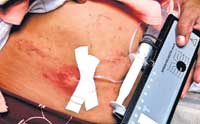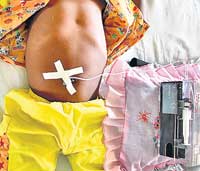
Thalassaemia drug: Patients complain, but doctors say nothing to worry“It’s smarting,” says a nine-year-old while a 20-year-old complains of a swelling and redness, showing their abdomens to prove their point. Both are patients who have come to the National Centre for Thalassaemia of the Kurunegala Teaching Hospital to complain about a medication causing certain reactions.
The drug, desferioxamine, has to be infused to stop excess iron from getting deposited in organs such as the liver, heart and kidney. Otherwise, complications come with an iron overload in the body due to the monthly blood transfusions and also the food taken by these patients, said a doctor at the centre, explaining that thalassaemia which is passed from parent to child is caused by changes to the genes that control the production of haemoglobin. “Haemoglobin is a protein in red blood cells that carries oxygen around the body and changes affecting haemoglobin result in severe anaemia. To overcome this, thalassaemia patients have to get monthly blood transfusions,” the doctor who declined to be identified said. Therefore, desferioxamine is a life-saving drug which helps excess iron to be excreted through urine. Some patients have to get the dose daily, others every other day and so on depending on the need and the infusion is usually done at home, with an infusion pump, The Sunday Times understands.“It has to be infused slowly through the skin of the stomach, generally in the night for about 10 hours while the child is sleeping. In the morning, it is taken off and the child goes to school,” another doctor said, explaining that the infusion pump is like an “external organ” for those with thalassaemia. There have been allergic reactions like the swelling of the injection site, redness and sometimes also itching from one brand that the patients are using, it is learnt, with the swelling going down only after about four days. “In a few, there is fever and in rare cases ulcers,” the doctor said, adding that as the infusion needs to be done regularly, most patients who are children are refusing to continue it.
Stressing that the drug was not substandard or of inferior quality, the Director of the Kurunegala Teaching Hospital, Dr. Ananda Gunasekera said the Health Ministry has been informed about the allergic reactions and it is looking into the matter. “Desferioxamine is a drug that patients with thalassaemia have to take for life,” he said detailing that the management of those living with this disease has advanced dramatically over the years, with the health authorities spending a lot on the relatively small number of patients. The authorities have followed procedure in securing the stocks of this drug and as is usual the generic drug has been purchased, it is learnt. Assuring that the needs of thalassaemia patients are being looked after Dr. Gunasekera says though the patient numbers are small, 30% of his hospital’s budget is spent on them.
|
|| Front
Page | News | Editorial | Columns | Sports | Plus | Financial
Times | International | Mirror | TV
Times | Funday
Times || |
| |
Reproduction of articles permitted when used without any alterations to contents and the source. |
© Copyright
2007 | Wijeya
Newspapers Ltd.Colombo. Sri Lanka. All Rights Reserved. |


